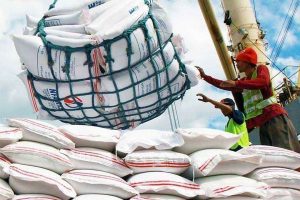LARGER farm sizes and mechanization will help reduce dependence on rice imports, an economist said at an Asian Development Bank (ADB) forum on Wednesday.
“(The) Philippines has been increasing imports of rice. Indonesia has a problem of high production costs of rice, so they restrict imports. That is going to continue, unless we expand farm size, facilitate mechanization, and facilitate labor saving technology,” Keijiro Otsura, a development economics professor at the Kobe University Graduate School of Economics, said at the ADB’s Food Security Forum.
Milled rice imports to the Philippines totaled 886,963.11 metric tons (MT) as of March, running ahead of the pace for imports in the first quarter of 2023.
El Niño is expected to weigh on rice production this year. The US Department of Agriculture forecasts that Philippine rice imports could hit up to 4 million MT this year.
Food security experts also noted the importance of extending financing to small-scale farmers and food producers, who supply 80% of the Asia-Pacific region’s food, according to the United Nations Food and Agriculture Organization.
Paul Winters, executive director of the Innovation Commission for Climate Change, Food Security, and Agriculture at the University of Chicago, noted that around 2-3% of climate financing goes to small-scale farmers, who are deemed most vulnerable to climate change impacts.
“We need to explore opportunities, not just working with governments, but working directly with farm cooperatives, farm organizations, and direct funding (to increase small-scale farmers’ allocations),” he told the forum.
Jyotsna Puri, associate vice-president of the International Food for Agricultural Development, said inputs from small-scale farmers are essential, as they are “more likely to be incorporating biodiverse methods, agro-ecology, agro-forestry.
Meanwhile, André Zandstra, global director for Innovative Finance & Resource Mobilization at the Consortium of International Agricultural Research Centers, noted that financial institutions should be more precise in their agendas for agricultural and food systems funding.
“Obviously, there’s been a very clear interest and importance in agriculture and food systems… but it’s also creating competition and fragmentation that we need to resist,” he said. — Beatriz Marie D. Cruz
